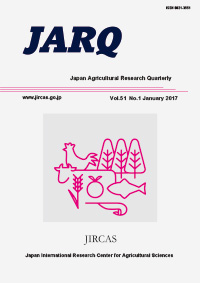The objective of this study was to investigate the effects of whole crop rice silage (WCRS) feeding on the lipid stability of beef and fat depot-specific adipokine gene expression patterns in Wagyu cattle. Wagyu steers were fed a control diet (CT, n=4) or a high-vitamin diet containing WCRS (HV, n=4) from 10 to 30 months of age. The α-tocopherol concentration of the longissimus muscle was significantly higher in the HV group than in the CT group. The percentage of metmyoglobin in the longissimus muscle was significantly lower in the HV group than in the CT group. The 2-Thiobarbituric acid-reactive substance values of the longissimus muscle were also significantly lower in the HV group than in the CT group. The plasma 8-isoprostane concentration, which is a biomarker of oxidative stress, was significantly lower in the HV group than in the CT group. The expression of adipokine genes (VEGF, FGF-2, and leptin) in mesenteric adipose tissue was significantly lower in the HV group than in the CT group. These results suggest that feeding beef cattle on WCRS improves both the quality of meat and the oxidative stress status.

